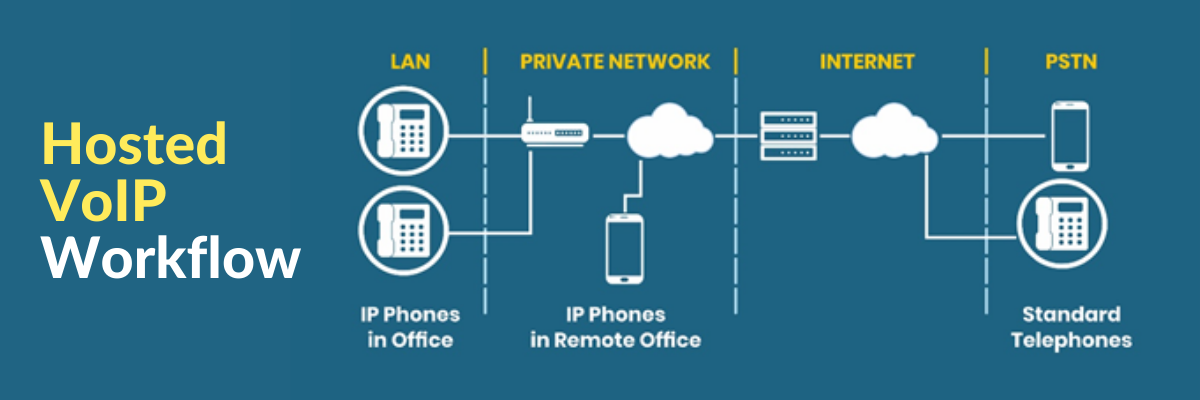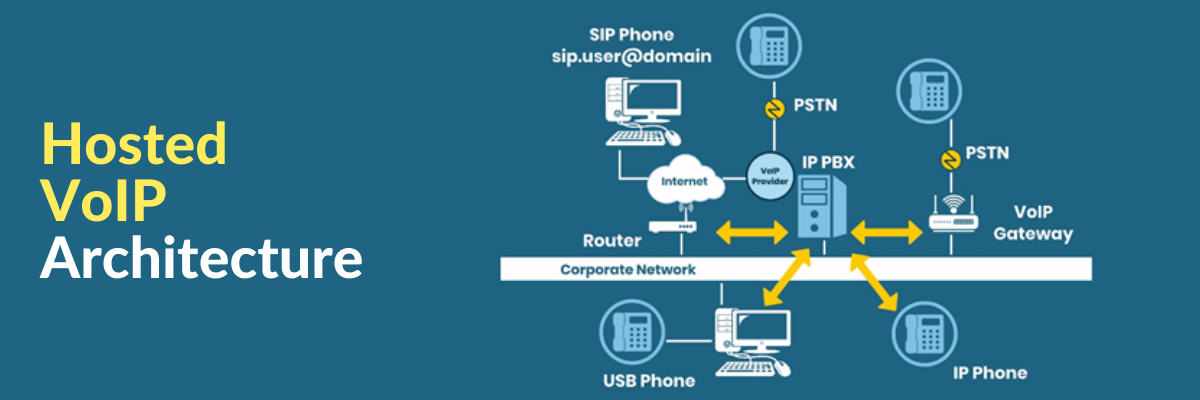If you are planning to update your business phone system, hosted VoIP is what you need. So, what is it, how does it work, and how can your business benefit from hosted VoIP solutions.
Hosted VoIP solution is an inexpensive, secure, and internet-based communication service that supports your business with ease. It includes all the features a business needs and is an excellent choice for those who want to grow their business.
Unlike the other on-premises VoIP services, the hosted VoIP provides your company with a complete phone system through a trusted VoIP provider over the Internet.
Instead of maintaining a series of servers, a hosted VoIP solution comes with calling capabilities and zero maintenance. So let’s get into the article to know more about hosted VoIP telephony and how it works.
→ What is Hosted VoIP Telephony?
Voice Over Internet Protocol, also known as VoIP, allows you to make voice calls using an Internet connection instead of a regular (or analog) phone line.
And a Hosted VoIP solution is a type of Internet-based telephony communication service that a third-party provider manages. It replaces traditional landlines with a cloud-based phone system.
Hosted VoIP services are for businesses that are looking for unified and inexpensive solutions for communication needs.
So, by subscribing to a hosted VoIP service, you are subscribing to the VoIP provider you had already set up the secure servers. As compared to the analog phone system, hosted VoIP is inexpensive.
→ How does Hosted VoIP Work?
Hosted Telephony uses the same LAN network as other office Internet and automatically connects to the IP network.
Let’s say that with hosted VoIP telephony, you can make a call from your office router through the Internet, which then transfers the data packet to the remotely connected VoIP server.
The server processes and manages everything like making calls, routing, and connecting to the appropriate digital destination. Receiving a call in hosted VoIP is the same, just in the reverse manner.

Hosted VoIP requires a stable Internet connection, so your business must have a secure and private network. You will also need good bandwidth to increase performance and to make high-quality calls.
**Must Read: A Guide to Selecting the Best Business Phone System**
→ Understanding the Hosted VoIP Architecture
VoIP architecture describes how the different components on the VoIP platform are connected to deliver different functions like:
- Signaling: Signaling allows different devices in the network to communicate with each other. This function is needed for call activation and all voice calls.
- Database Service: This lets you locate endpoints via IP addresses, implement security functions, and generate reports for billing.
- Call Connects and Disconnects: VoIP protocols help connect and disconnect the calls and define the patterns of the call sessions.

Efficient VoIP Architecture must include the Following Components:
- Signaling gateway controller: Also called ‘called agent,’ it’s the heart of the VoIP platform and is responsible for connecting analog call services with digital voice calls. Some other key features of SGC include voice or media control protocols, media connection allocation, call records, and bandwidth management control.
- Media Gateway: This is responsible for transmitting voice packets and functions like sharing voice data, supporting trunking, and managing the digital processing resources.
- Media Server: It allows the use of additional features like voice mail and video calls. It is used for functions like voicemail, the transmission of customized call progress tones, transcription of voicemail to email, and supporting interactive Voice Response (IVR).
- Application Server: It provides value-added customer-specific and global services like call forwarding, transfer, private dialing plans, call detail record generation and free phone service to IP networks.
- IP Network: It connects various components of the VoIP platform and allows the voice data packets to travel between the source and destination easily.
→ Features of Hosted VoIP Solutions
Hosted VoIP comes with various features, which are essential for call centers and businesses. Some of them include:
- Conference calling
- Mobile app
- CRM integration
- Auto Attendant
- HD call Quality
- Toll-free phone numbers
- Voicemail-to-email
- Toll-free phone number
- Voicemail-to-email
- Unlimited Scalability
- Call routing and screening
- Video Conferencing
**Read our detailed blog on 50+ Features of a Hosted VoIP Phone System**
→ Advantages of Hosted VoIP over the Alternative Phone System
Businesses of all sizes are switching to hosted voice-over-IP as a communication tool for their businesses. Why? There’s a wide range of benefits of VoIP services that include cost, convenience, reliability, and more. Depending upon your size of business, you can save your phone bill by switching to hosted voice.
Let’s have a look at the advantages of hosted VoIP:
1. Easy Management:
Unlike traditional phone systems, which require a technician to install the equipment and run the wiring, the hosted VoIP phone installation is simple. All you need is a handset, which can go with your already existing wiring and switches.
2. Contact Center Benefits:
Hosted VoIP is for every business, a small customer service representative office, or hundreds of agents operating around the clock.
3. Best Sound Quality:
Today’s VoIP solutions outmatch the voice clarity of traditional phone networks. In addition, vendors have significantly improved call quality and eliminated call drops, so you can no longer tell the difference between a VoIP call and a traditional one.
4. Cost Savings:
Hosted VoIP solutions are extremely cost-effective, and this starts with the fact that most service providers offer the solutions at an extremely low upfront cost. Furthermore, the user can choose from a comprehensive and flexible range of solutions and pay for what he uses.
With a monthly fee, a business organization can enjoy extremely effective hosted VoIP. This voice communications system also has an extremely low total cost of ownership. This is because a business organization does not have to invest in trained personnel and the physical space to hold communications systems.
5. Portability:
Shifting homes or businesses means a fairly long waiting period for the phone number to get shifted or updated. With hosted VoIP solutions, however, you can carry your communications infrastructure anywhere that you go. All you need to have is Internet or IP connectivity. Imagine all the advantages that you can enjoy using just one telephone number wherever you go!
6. Elimination of Equipment:
One of the biggest advantages that you can enjoy with hosted VoIP solutions is the fact that there is no equipment. This simply means that a business does not have to invest in equipment; they can have a voice communication system that is handled by the cloud. In addition, with hosted voice communications, servers, regular maintenance, physical space, and telephone equipment upgrade get eliminated.
7. Data Integration:
Creating a positive “customer experience” means that you need to integrate your communications across channels. This can require bringing together social media, phones, email, voicemails, chat, and other communication methods your customers use.
By selecting a VoIP provider that integrates with your CRM, you can develop insight into your company’s customer communication. This may include:
- Voicemail to email transcription
- Mobility
- Chat
- Social media messages
**Related Read: VoIP Integration with CRM: Everything you need to know!**
8. Easy Collaboration with Applications:
Hosted VoIP service providers will also ensure that they integrate their systems with a host of other applications that a business organization may be using.
Some of these applications are:
- Email services,
- Social networking,
- Web browsers,
- Instant messaging services and so on.
For instance, the user of hosted VoIP can enjoy having a button on an email that allows him to place a voice call. This simply means that there is a huge degree of flexibility as far as voice communications are concerned.
** Must Read: Benefits of Hosted VoIP for Business [Shared by Experts] **
→ Bonus Section – Most FAQs Related to Hosted VoIP
- Can I Host my Own VoIP?
- Are PBX and VoIP the Same?
- Is Hosted VoIP Right for your Business?
- Who is the Best-Hosted VoIP Provider for Business?
Qn1. Can I Host my Own VoIP?
Yes, if you have technical and programming knowledge of know-how, you can install and maintain your own VoIP server. Keep in mind that you need to buy your own software and hardware with both upfront and maintenance costs. So, do not expect it to be inexpensive as hosted VoIP.
Qn2. Are PBX and VoIP the Same?
PBX or private branch exchange and VoIP are used interchangeably. While the PBX refers to the unified private telephone network, which can be used for internal and external communications, VoIP needs the Internet to send and receive calls.
Qn3. Is Hosted VoIP Right for your Business?
Still, confused about choosing the hosted VoIP for your business? Telecloud hosted VoIP is a good choice because:
- Features of an enterprise business phone system at the most affordable rate
- Less costly than the traditional landline
- You get complete flexibility
- It’s secure and comes with HIPAA complaint
- Has resilient 99.999% uptime
Qn4. Who is the Best-Hosted VoIP Provider for Business?
Telecloud is one of the top hosted VoIP providers for businesses. With a 99.999% uptime, offers HIPAA-compliant solutions. For more details, visit here.
